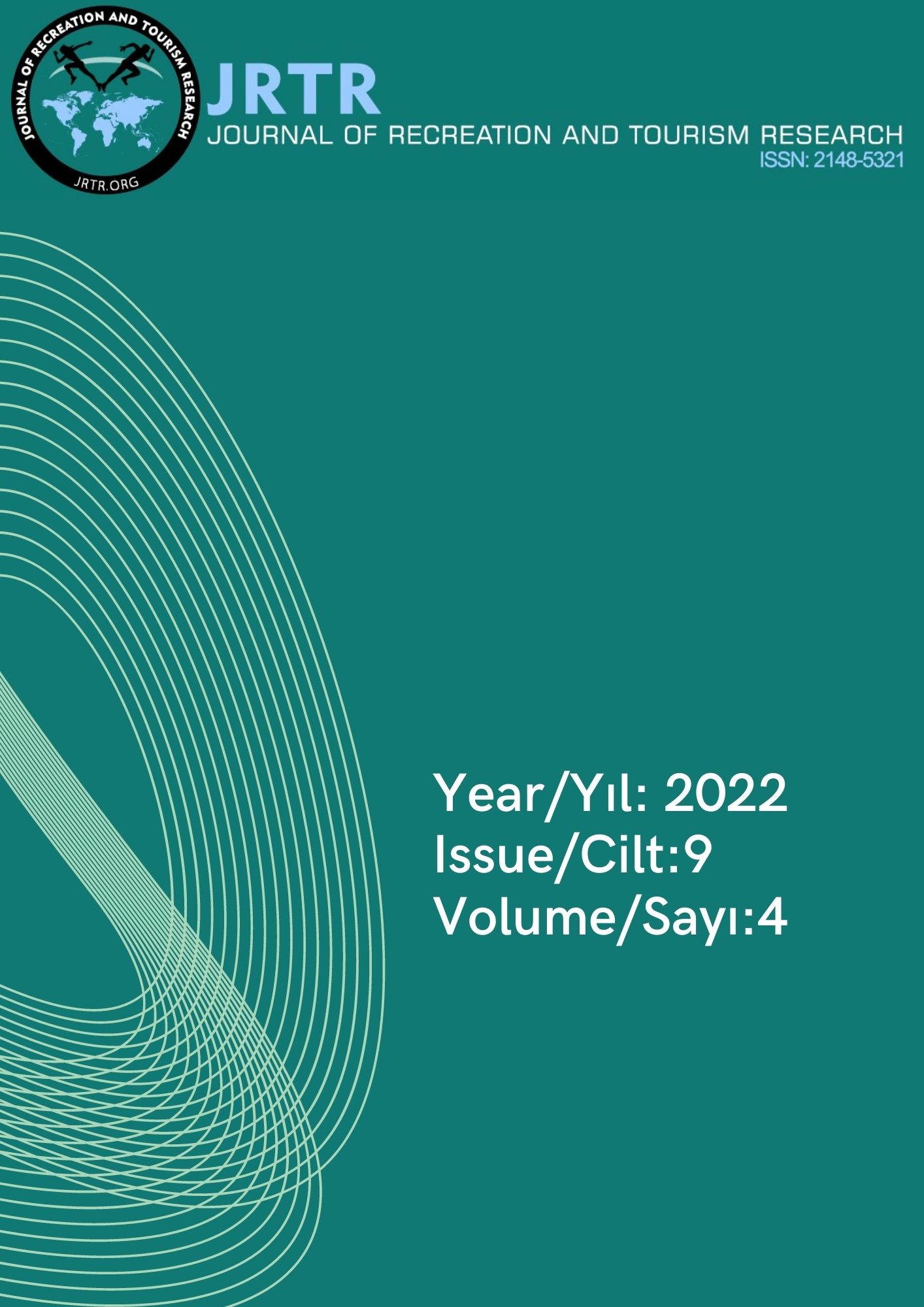REKREASYON BAĞLAMINDA CSİKSZENTMİHALYİ’NİN AKIŞ TEORİSİNE KURAMSAL BİR BAKIŞ
DOI:
https://doi.org/10.5281/zenodo.7494875Anahtar Kelimeler:
Akış, Akış Teorisi, Csikszentmihalyi, Rekreasyon, Sosyal MedyaÖzet
Rekreasyon bağlamında Csikszentmihalyi’nin Akış Teorisi ele alınarak gerçekleştirilen bu çalışmada, araştırma verileri öncelikle ulusal ve uluslararası yazında “Akış”, “Akış Teorisi”, Flow Theory”, “Rekreasyon”, “Recreation” kelimeleri ile doğrudan konu ile ilgili kaynakların taranması amacıyla elde edilmiştir. Bu araştırma teorinin gelişim sürecini irdelemek ve kuramsal temellerinin neler olduğunu incelemek amacıyla nitel bir araştırma tasarımı içermektedir. Çalışmada teorinin gelişim evrelerini irdelemek, kuramsal temellerinin neler olduğunu incelemek ve rekreasyon olgusunu, akış teorisi alanında yapılan çalışmalar çerçevesinde analiz etmek çalışmanın amacını oluşturmaktadır. Rekreasyon bağlamında ele alınan akış teorisinin kuramsal bir çerçevesinin ortaya koyulmaya çalışıldığı bu çalışmada, akış durumunun diğer alanlarla ilişkisin ele alındığı kadar rekreasyon ve sosyal medya gibi alanlarla da bağlantılarının olduğu sonucuna ulaşılmıştır. Bu bağlamda, rekreasyon kavramının akış teorisi bakış açısıyla araştırılması ve açıklanması önemli görülmektedir. Çalışmanın gelecekte yapılacak araştırmalar içinse akış teorisi bağlamında rekreasyon literatürüne önemli ölçüde kaynaklık edebileceği düşünülmektedir.
İndirmeler
Referanslar
Abuhamdeh, S., & Csikszentmihalyi, M. (2012). The İmportance of Challenge for the Enjoyment of İntrinsically Motivated, Goal-Directed Activities. Personality and Social Psychology Bulletin, 38(3), 317-330.
Akşit Aşık, N. (2020). Rekreasyon Tarihsel Gelişim, Teoriler, Farklı Alanlarla İlişkiler ve Güncel Gelişmeler. Yağmur, Y., Gaberli, Ü., (Ed.). Ankara: Nobel Bilimsel Eserler.
Blogteb, (2022). Mikro Ustalık Nedir? Akış Kavramı Nedir? Hayatımıza Nasıl Adapte Edebiliriz?https://www.blogteb.com/mikro-ustalik-nedir-akis-kavrami-nedir-hayatimiza-nasil-adapte-edebiliriz/amp/ Erişim Tarihi: 25.04.2022
Brailovskaia, J., Schillack, H., & Margraf, J. (2020). Tell Me Why Are You Using Social Media (SM)! Relationship Between Reasons for Use Of SM, SM Flow, Daily Stress, Depression, Anxiety, and Addictive SM Use – An Exploratory İnvestigation Of Young Adults İn Germany. Computers in Human Behavior, 113- 106511, 1-9.
Csikszentmihalyi, M., & LeFevre, J. (1989). Optimal Experience in Work and Leisure. Journal of Personality And Social Psychology, 56(5), 815.
Csikzentmihalyi, M. (1998). Finding Flow: The Psychology of Engagement with Everyday Life. Leadership and Flow”: A Research Program. https://www.researchgate.net/publications/200026151.
Csikszentmihalyi, M., & Larson, R. (2014). Flow And The Foundations of Positive Psychology Publisher: Springer.
Csikszentmihalyi, M., & Asakawa, K. (2016). Universal And Cultural Dimensions of Optimal Experiences. Japanese Psychological Research, 58(1), 4-13.
Csikszentmihalyi, M. (2017). Akış: Mutluluk Bilimi (B. Satılmış, Çev.). Ankara: Buzdağı Yayınevi.
Hyun, H., Thavisay, T., & Lee, S. H. (2022). Enhancing The Role Of Flow Experience İn Social Media Usage And Its İmpact On Shopping. Journal of Retailing and Consumer Services, 65, 102492.
Kaur, P., Dhir, A., Chen, S., & Rajala, R. (2016). Flow in Context: Development and Validation of the Flow Experience İnstrument for Social Networking. Computers in Human Behavior, 59, 358-367.
Lee, S., & Kim, B. G. (2017). The Impact Of Qualities Of Social Network Service On The Continuance Usage Intention. Management Decision. 55(4), 701-729.
Lin, J., Lin, S., Turel, O., & Xu, F. (2020). The Buffering Effect Of Flow Experience On The Relationship Between Overload And Social Media Users’ Discontinuance İntentions. Telematics and Informatics, 49, 101374.
Liu, C. C. (2017). A Model For Exploring Players Flow Experience İn Online Games. Information Technology & People. 30-1, 139-162.
Mahfouz, A. Y., Joonas, K., & Opara, E. U. (2020). An Overview Of And Factor Analytic Approach To Flow Theory İn Online Contexts. Technology in Society, 61, 101228.
Munusturlar, S., Kurnaz, B. Yavuz, G., Özcan, Ö., & Karaş, B. (2017). Boş Zaman Davranışını Açıklamaya Işık Tutan Kuramsal Yaklaşımlar. Ulusal Spor Bilimleri Dergisi, 1(1), 1-19.
Nakamura, J., & Csikszentmihalyi, M. (2009). Flow Theory and Research. In C. R. Snyder, & S. J. Lopez (Eds.), Oxford Handbook of Positive Psychology. Oxford University Press.
Novak, T. P., Hoffman, D. L. & Yung, Y-F. (1997) “Modeling the Structure of the Flow Experience Among Web Users”, Marketing Science and the Internet Mini-Conference MIT, 1-35.
Özdemir, A., Durhan, T. A., & Akgül, B. (2020). Flow Yaşantı Ölçeğinin Rekreasyonel Etkinliklere Uyarlanmasına Dair Geçerlik ve Güvenirlik Çalışması. Gazi Beden Eğitimi ve Spor Bilimleri Dergisi, 25(2), 107-116.
Singh, A., Halgamuge, M. N., & Moses, B., (2019). An Analysis of Demographic and Behavior Trends Using Social Media: Facebook, Twitter, and Instagram. Social Network Analytics, 87-108.
Şahin, F. & Karahan, M. O. (2021). Akış Deneyiminin Mobil Oyun Bağımlılığı ve Keşifsel Davranış Üzerindeki Etkisi: Ağızdan Ağıza Pazarlama Kapsamında Bir İncelenme. Manas Sosyal Araştırmalar Dergisi, 10(2), 1314-1331.
Tekin, A., Tekin, G., & Çalışır, M. (2017). Rekreasyon Bilimi 2. Karaküçük, S., Kaya, S., Akgül, B. M., (Ed.). Ankara: Gazi Kitapevi.
Uluçakar, M., & Demir, B.M. (2021). Bir Kuramsal Analiz: Çatışma ve Terör. Barış Araştırmaları ve Çatışma Çözümleri Dergisi, 9(2), 354-377.
Tse, D.C., Fung, H. H., Nakamura, J., & Csikszentmihalyi, M. (2018). Teamwork and Flow Proneness Mitigate the Negative Effect of Excess Challenge On Flow State. The Journal of Positive Psychology, 13(3), 284-289.
İndir
Yayınlanmış
Nasıl Atıf Yapılır
Sayı
Bölüm
Lisans
Telif Hakkı (c) 2022 Journal of Recreation and Tourism Research

Bu çalışma Creative Commons Attribution-NonCommercial 4.0 International License ile lisanslanmıştır.






